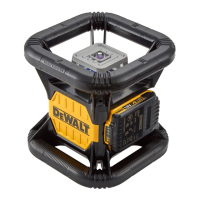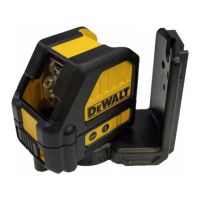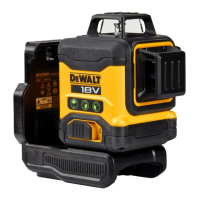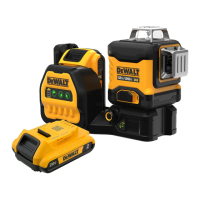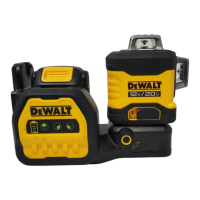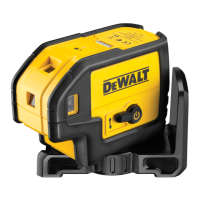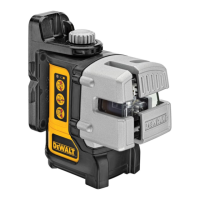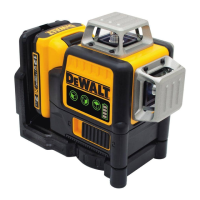30
ENGLISH
Wall Set-up (Fig. C, M)
The wall mount is used for mounting the laser to a wall
track to aid in drop ceiling installation and other specialty
levellingprojects.
CAUTION: Before attaching the laser level to wall
track or ceiling angle, be sure that the track or angle is
properlysecured.
1. Place the laser on the mounting base
37
aligning the
5/8-11 screw hole on the tripod adapter (
15
, Fig. C)
attached to the bottom of the laser with the hole
39
in the
mounting base. Turn the mounting knob
40
to secure the
laser.
2. With the wall mount measuring scale
41
facing you,
loosen the wall mount clamp locking knob
42
to open the
clampjaws.
3. Position the clamp jaws around the wall track or ceiling
angle and tighten the wall mount clamp locking knob
42
to close the clamp jaws onto the track. Be sure that
the wall mount clamp locking knob is securely tightened
beforeproceeding.
CAUTION: Always use a ceiling wire hanger or equivalent
material, in addition to the wall mount clamp locking
knob, to help secure the laser level while mounting it to a
wall. Thread the wire through the handle of the laser level.
DO NOT thread the wire through the protective metal
cage. Additionally, screws may be used to fasten the wall
mount directly to the wall as a back-up. Screw holes
43
are located at the top of the wall mount.
4. Using the base leveling knob
44
, approximate a level
position from the wall.
5. The laser can be adjusted up and down to the desired offset
height for working. To change the height, loosen the locking
knob
45
located on the left of the wall mount.
6. Turn the adjustment knob
46
, located to the right of the
wall mount, to move the laser level up and down to set your
height. Use the wall mount measuring scale
41
to pinpoint
your mark.
NOTE: It may be helpful to turn the power on and turn the
rotary head so that it puts a dot on one of the laser scales.
The DeWALT target card is marked at 38mm, therefore, it
may be easiest to set the offset of the laser to 38mm below
thetrack.
7. Once you have positioned the laser at the desired height,
tighten the locking knob
45
to maintain this position.
Tripod Set-up (Fig. C)
1. Position the tripod securely and set it to the desired height.
2. Make sure that the top of the tripod is roughly level. The
laser will self-level only if the top of the tripod is within ± 5˚
of level. If the laser is set up too far out of level, it will beep
when it reaches the limit of its leveling range. No damage
will be done to the laser, but it will not operate in an “out of
level” condition.
3. Secure the laser to the tripod by attaching the tripod
adapter
15
as shown in Figure C to the laser body. The
adapter may be assembled to the bottom for level mode
(
17
or to the side for plumb mode
16
. Place the assembly
on the tripod and screw the threaded knob on the tripod
into the female thread on the tripod adapter.
NOTE: Be sure that the tripod you are working with has a
5/8"–11 threaded screw to ensure secure mounting.
4. Turn the laser on and adjust the rotation speed and controls
as desired.
Floor set-up (Fig. D)
The laser level can be positioned directly on the floor for leveling
and plumbing applications such as framing walls.
1. Place the laser on a relatively smooth and level surface
where it will not be disturbed.
2. Position the laser for a level
17
or plumb
16
setting.
3. Turn the laser on and adjust the rotation speed and controls
as desired.
NOTE: The laser will be easier to set up for wall applications if
the rotation speed is set to 0 rpms and if the remote control is
used to line up the laser with control marks. The remote allows
one person to set up the laser.
OPERATION
WARNING! Do not place the laser in a position
which may cause anyone to intentionally or
unintentionally stare into the laser beam. Serious eye
injury may result from staring at the beam.
Instructions for Use
WARNING: Always observe the safety instructions and
applicable regulations.
• To extend battery life per charge, turn the laser off
when it is not in use.
• To ensure the accuracy of your work, check the laser
calibration often. Refer to Field Callibration Check
under Laser Maintenance.
• Before attempting to use the laser, make sure the tool
is positioned on a relatively smooth, secure surface.
• Always mark the centre of the laser line or dot. If you
mark different parts of the beam at different times you
will introduce error into your measurements.
• To increase working distance and accuracy, set up the
laser in the middle of your working area.
• When attaching to a tripod or wall, mount the
lasersecurely.
• When working indoors, a slow rotary head speed will
produce a visibly brighter line; a faster rotary head
speed will produce a visibly solid line.
• To increase beam visibility, wear Laser Enhancement
Glass es and/or use a Laser Target Card to help find
the beam.
• Extreme temperature changes can cause movement
or shifting of building structures, metal tripods,
equipment, etc., which can affect accuracy. Check
your accuracy often while working.
